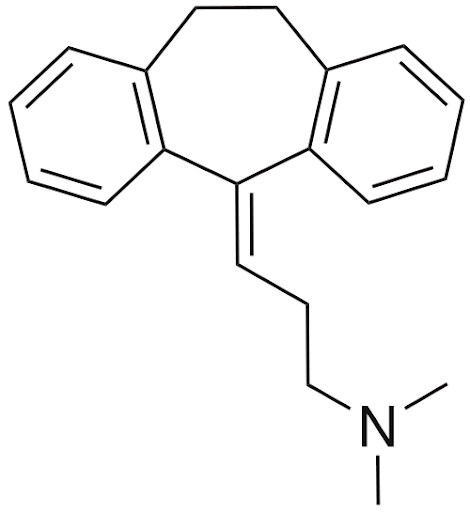Tryptomer Tablets (Generic Elavil) - Active Ingredient And Chemical structure
The active ingredient contained in Tryptomer Tablets (Generic Elavil) is Amitriptyline Hydrochloride. Amitriptyline HCl is a white, odorless, crystalline compound that is freely soluble in water. The structure is shown below
Generic Elavil (Amitriptyline Hydrochloride) - Uses
Amitriptyline Hydrochloride in the form of Generic Elavil Tablets (Tryptomer Tablets) is used to treat depresssion. Generic Elavil is also used aa a sedative, and is useful in depressed patients with insomnia, restlessness, and nervousness.
Generic Forms and Brand names of Elavil Tablets
Tryptomer manufactured by Wockhardt Ltd., India is an effective treatment for depression . It is also used to relive the symptoms of migraines, tension headaches, anxiety attacks and some schizophrenic symptoms. Elavil which has the active ingredient Amitriptyline Hydrochloride is also sold as Tryptizol, Laroxyl, Sarotex, Lentizol and under various other brand names.
Tryptomer Tablets Preparations
Tryptomer Tablets (Generic Elavil) are available as tablets of 10 mg, 25 mg and 75 mg.
Tryptomer Tablets - Storage Requirements
Tryptomer Tablets (Generic Elavil) are to be stored at room temperature (15°C to 30°C). Store away from heat, moisture, and light.
Tryptomer Tablets (Generic Elavil) - Dosage
The adult dosage for Tryptomer Tablets is 25 mg three times a day. The dosage may be increased if necessary to a total of 150 mg a day. In the case of adolescent and elderly Patients lower dosages are recommended. 10 mg three times a day or 10 mg twice with 20 mg at bedtime is recommended. Dosage should be started at a low level and increased gradually, after carefully observing the clinical response of the patient to Tryptomer and any evidence of intolerance.
Tryptomer Tablets (Generic Elavil) - Contraindications And Warnings
Tryptomer is contraindicated in patients who have shown prior hypersensitivity to the active ingredient Amitriptyline HCl or to any inactive ingredient.Tryptomer Tablets should not be given along with or within at least 14 days following the discontinuance of a monoamine oxidase inhibitor (MOI). Generic Elavil should not be used during the acute recovery phase following myocardial infarction, and in the presence of acute congestive heart failure.
Tryptomer may block the antihypertensive action of guanethidine or similarly acting compounds. Generic Elavil should be used with caution in patients with a history of seizures and, because of its atropine like action, in patients with a history of urinary retention, angle-closure glaucoma or increased intraocular pressure. In patients with angle-closure glaucoma, even average doses of Generic Elavil may precipitate an attack. Patients with cardiovascular disorders have to be observed closely.
Withdrawal Symptoms
Abrupt cessation of treatment after prolonged administration of Tryptomer Tablets may give rise to nausea, headache, and malaise. Gradual dosage reduction has been reported to produce, within two weeks, transient symptoms including irritability, restlessness, and dream and sleep disturbance.
Side Effects Of Tryptomer Tablets (Generic Elavil)
The most common side effects of Tryptomer Tablets are described below:
Cardiovascular:
Myocardial infarction; stroke; nonspecific EGG changes and changes in AV conduction; heart block; arrhythmias; hypotension, particularly orthostatic hypotension; syncope; hypertension; tachycardia; palpitation.
CNS and Neuromuscular:
Coma; seizures; hallucinations; delusions; confusional states;disorientation; incoordination; ataxia; tremors; peripheral neuropathy; numbness, tingling. and paresthesias of the extremities; extrapyramidal symptoms including abnormal involuntary movements and tardive dyskinesia; dysarthria; disturbed concentration; excitement; anxiety; insomnia; restlessness; nightmares; drowsiness; dizziness; weakness; fatigue; headache; syndrome of inappropriate ADH (antidiuretic hormone) secretion; tinnitus; alteration in EEG patterns.
Anticholinergic:
Paralytic ileus; hyperpyrexia; urinary retention; dilatation of the urinary tract; constipation; blurred vision, disturbance of accommodation, increased ocular pressure, mydriasis; dry mouth.
Allergic:
Skin rash; urticaria; photosensitization; edema of face and tongue.
Hematologic:
Bone marrow depression including agranulocytosis, leukopenia, thrombocytopenia; purpura; eosinophilia.
Gastrointestinal:
Rarely hepatitis (including altered liver function and jaundice); nausea; epigastric distress; vomiting; anorexia; stomatitis' peculiar taste; diarrhea; parotid swelling; black tongue
Endocrine:
Testicular swelling and gynecomastia in the male; breast enlargement and galactorrhea in the female; increased or decreased libido; impotence; elevation and lowering of blood sugar levels.
Other Adverse Reactions:
Alopecia; edema; weight gain or loss; urinary frequency; increased perspiration.